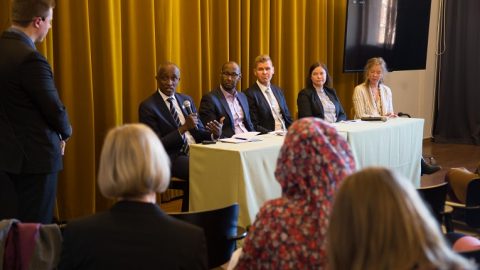UNDP report: Excessive security responses and lack of education bolster ranks of extremist groups in Africa
Violent extremism contributes to some of the world’s worst humanitarian catastrophes. It also poses a challenge to the gains in development enjoyed by many countries in Africa, a new report concludes.
The typical extremist organisation recruit is a 17–26-year-old from a state’s poorest, peripheral areas with only a few years of secular education and a low level of religious literacy. At the time of joining, the recruit’s main concern in life is employment. His or her confidence in institutions and governance is limited.
This is one of the main conclusions of the UN Development Program UNDP’s extensive report, launched in Helsinki on Friday 4th of May. The Journey to Extremism report sheds new light on the path to radicalisation and on how the effects of violent extremism hampers humanitarian work and development cooperation. (Download the full report in pdf-format here.)
Researchers conducted interviews with 718 people from Somalia, Nigeria, Kenya, Sudan, Niger and Cameroon – the largest sample of interviews with former members of extremist groups thus far.
With the above-mentioned preconditions, a recruit only needs to reach a “tipping point” before making the final decision to join an extremist group. In 71 percent of the cases, the defining event consists of a government action, often an excessive security response against a perceived terrorist threat.
The decision to join is quick, says Mohamed Yahya, lead author of UNDP’s research. Some 80 percent join an extremist group within a year after the tipping point, and a striking 48 percent within less than a month.
“This emphasises the fact that development solutions are essential in addressing the incentives and drivers of violent extremism. Military solutions are not enough”, Yahya concludes.
Research in sync with FCA’s key findings

FCA’s Reach Out coordinator Milla Perukangas providing perspectives on preventing violent extremism in Finland. Photo: Rabbe Sandström
The destructive consequences of violent extremism have resulted in 33 300 fatalities in Africa between 2011 and 2016, not to mention the devastating effects related to displacement and economy.
Extremism-related research has thus far largely been the territory of organisations working with security issues, although the issue profoundly affects development actors, says Yahya. It threatens to stunt development outcomes for generations to come if left unchecked.
“How can you talk about sustainable development goals and women’s rights when the question for many is whether they dare to go to the market and take the risk to be blown up”, Yahya says.
Almost 80 percent of the interviewees had previous connections to the extremist groups Boko Haram and al-Shabaab, which Finn Church Aid’s (FCA) previous research has focused on. UNDP’s research is in line with FCA’s previous findings, for instance that family and friends – not religious leaders – recruit most members.
(Read more about FCA’s research on al-Shabaab by clicking here and about Boko Haram by clicking here.)
Yahya highlights the role of local voices as a counterbalance to the influence of extremist groups, especially the role of religious leaders, which is one of the key groups supported by FCA’s peace work.
“But we also need to create viable exit paths, which include opportunities created by development in these poor peripheral areas”, Yahya says and adds that current circumstances do not contain enough options.
“Like one of our interviewees said: ‘After I left Boko Haram, I was welcomed by poverty’.”
Trust is key in preventing violent extremism

Panel discussion on preventing violent extremism, held at the UNDP’s report launch in Helsinki on May 4th. From the left UNDP’s Africa Regional Programme Coordinator Mohamed Yahya, Arshe Said from the Finnish Somali League, David Korpela from the Finnish Ministry for Foreign Affairs, Katja Creutz from the Finnish Institute of International Affairs and Milla Perukangas, FCA’s Reach Out coordinator. Photo: Rabbe Sandström
The question of how to prevent youth from joining extremist groups is a question for the whole society, says Milla Perukangas, coordinator for FCA’s Reach Out project against violent extremism in Finland. FCA has put its international experience and knowhow of preventing violent extremism in use in Finland since 2015 as a response to the vast number of foreign fighters traveling from Europe to conflict zones.
The solutions are always context-specific, but there are universal keywords that are applicable in all circumstances. Trust is one of them, says Perukangas. The Reach Out project has specialised in building bridges between those at risk of recruitment, their families, civil society actors and Finnish authorities.
“We need to empower youth through for instance education and opportunities to both speak their mind and find employment”, Perukangas said in her presentation at the report’s launch event in Helsinki.
“In the long run, the work to prevent violent extremism needs more emphasis on the human experience and the initial grievances of people in affected areas.”
Text: Erik Nyström
Download the full UNDP report The Journey to extremism in pdf-format by clicking this link. Read more about FCA’s research on al-Shabaab by clicking here and about Boko Haram by clicking here. Read more about the Reach Out project here.